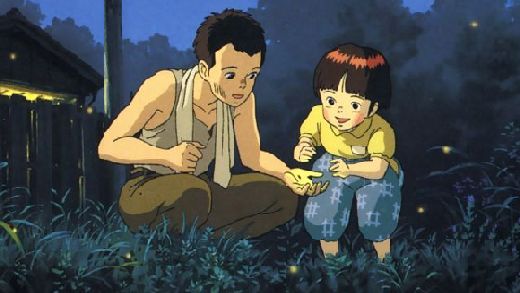Grave of the Fireflies (1988) 

Director: Isao Takahata
Cast: Tsutomu Tatsumi, Ayano Shiraishi, Akemi Yamaguchi
Synopsis: A tragic film covering a young boy and his little sister’s struggle to survive in Japan during World War II.
WARNING! – This review contains SPOILERS!
The fact that Grave of the Fireflies opens with the death of its lead character, Seita, a young teenage victim of the hardships of war, is a telling measure of the guilt and pain which must have haunted Akiyuki Nosaka, the author of the semi-autobiographical novel Hotaru no haka upon which the film is based. Nosaka lost his own younger sister to malnutrition in similar circumstances to those in the movie during the final days of WWII, and it is impossible to imagine the grief he must have felt. That downbeat opening to the movie suggests the supposedly cathartic experience of writing the novel may not have helped to assuage his guilt in the way he might have hoped, while also explaining why Seita never manages to invoke the same measure of sympathy as his devoted and trusting little sister Setsuko.
The film opens in the final months of WWII. The Germans have surrendered, and Japan stands alone, constantly bombarded by waves of American bombers dropping napalm canisters on the residential areas of Kobe, which ignite a few moments after landing to spread uncontrollable fires throughout the predominantly wooden townships. Seita, and his mother and five-year-old sister Setsuko separate when one air raid sounds, and the children emerge from the bombing to discover their home destroyed and their mother fatally wounded from horrendous injuries. Their father is fighting with the Japanese navy, so the children present themselves to a distant aunt who only reluctantly takes them in.
From the above it’s obvious that, although it’s an animation, Grave of the Fireflies is not a film for young children. The injuries to Seita and Setsuko’s mother are shown with a vivid, unflinching matter-of-factness which is typical of the style of the film’s storytelling, which is compared by many to that of the neo-realist movement. It’s a smart decision on the part of director and writer Isao Takahata, ensuring there is no tendency to descend into sentimentality, which paradoxically makes the emotional impact of the children’s suffering that much more powerful.
Their aunt soon grows tired of having the children under her feet. Seita’s school has been destroyed, and he does nothing to help the country’s war effort, something that rankles his aunt, so that she begins feeding her own, older, children — who are making a contribution — larger shares of their meagre supplies of food, even when those supplies are provided by funds from the sale of the kimonos that once belonged to the orphans mother. Eventually growing weary of their aunt’s displeasure with them, Seita impulsively decides to move out, and the children make their home in an abandoned bomb shelter on the outskirts of the town. At first, their life is almost idyllic, but as time goes on their existence becomes increasingly desperate, and Seita must resort to stealing villagers’ food in order to feed himself and his little sister.
Grave of the Fireflies is one of those movies that starts very slowly before gathering momentum and then relentlessly holding you in its grip as the tone’s increasingly dark nature clashes with its resolutely calm, almost dispassionate portrayal. The plight of little Setsuko becomes so heart-breaking that the desire to simply turn away from what we’re witnessing is almost overwhelming, largely because her repeated association with the achingly beautiful but short-lived fireflies of the title leaves us in no doubt about her eventual fate. It’s an incredible achievement when you think that these characters are nothing more than line drawings — refreshingly old-fashioned ones in the new age of computer animations: this movie simply wouldn’t work had it been created by computer graphics — and the fact that it is based on truth gives it an added resonance that anti-war movies set on the battlefields of war can never have.
(Reviewed 8th August 2013)
httpv://www.youtube.com/watch?v=9_KCRIDbEXM
